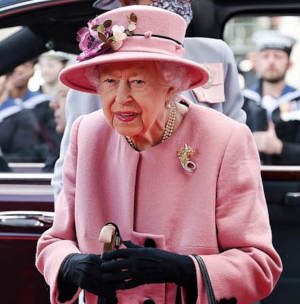 Queen Elizabeth II,
who in 2015 became the longest-serving British monarch in history, was
not born to be queen. In fact, as a child in pre-war Britain, she never
expected to be queen. She – and everyone else –
imagined that her uncle
Edward, the King's eldest
son, would follow
normal tradition and become the next British monarch when his father,
King George V, died; and that after him, the crown would pass
to his son
or
daughter, assuming that he married and produced an heir.
Queen Elizabeth II,
who in 2015 became the longest-serving British monarch in history, was
not born to be queen. In fact, as a child in pre-war Britain, she never
expected to be queen. She – and everyone else –
imagined that her uncle
Edward, the King's eldest
son, would follow
normal tradition and become the next British monarch when his father,
King George V, died; and that after him, the crown would pass
to his son
or
daughter, assuming that he married and produced an heir.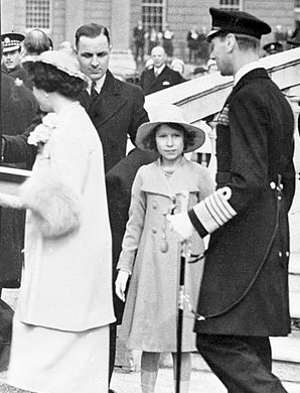 1937
- Aged 11. Princess Elizabeth with her parents, already on official
business. Her father has just become king George VI, and Elizabeth is
now next in line to the throne.
1937
- Aged 11. Princess Elizabeth with her parents, already on official
business. Her father has just become king George VI, and Elizabeth is
now next in line to the throne.Yet as often happens, history did not go forward according to plan. In January 1936, King George V died at the age of 70, and the crown automatically passed to his elder son Edward, Prince of Wales, who immediately became King Edward VIII. The British government was alarmed; Edward was seen as a playboy, notorious for his affairs with married women. The government, of course, could not remove a king, but they made it plain to him that he had to change his ways. Edward did not change his ways; on the contrary, he announced on November 16th that he was going to marry his lover, Mrs. Wallace Simpson, a twice-divorced American. The British establishment was rocked to the core by this news: social traditions in those days were strict, and it was expected that the future King of England would marry a young lady from the British or European aristocracy, not a divorced commoner from the USA.
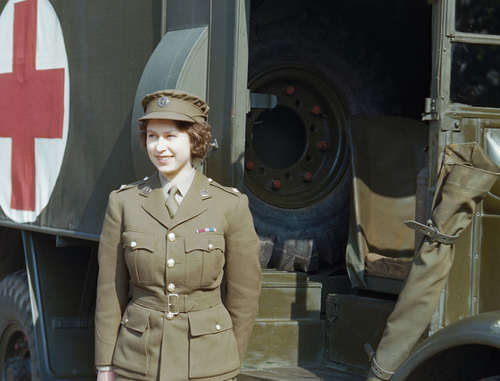 Aged
19, Princess Elizabeth signed up as an army driver during the
final year of the Second World War.. She did not imagine that 7 years
later, she would be Queen
Aged
19, Princess Elizabeth signed up as an army driver during the
final year of the Second World War.. She did not imagine that 7 years
later, she would be Queen So it was that Edward's younger brother Bertie - Albert George - found himself thrust into the limelight as he became the next king of England, a role which neither he nor his family had ever expected. He chose the regnal name George VI.
George VI had two daughters but no sons, so when he ascended to the throne as King of England on 12th May 1937, at the age of 41, it was his elder daughter, Elizabeth, aged 11, who suddenly found herself next in line to the British throne.
Though Britain was plunged into war between 1939 and 1945, Elizabeth and the British people in general assumed that King George VI would live to a reasonable age, remaining king through until at least the 1960s or 1970s. As a princess, and first in line to the throne, Elizabeth nonetheless began to take up some royal duties after the war ended, but with no sense of urgency. Her father George VI was very different from his elder brother Edward, and took the duties of kingship very seriously. In the post-war years, he was a very popular monarch, respected for his hard work and his attachment to his people.
So it came as a bombshell when, on 6th February 1952, George VI, who was a heavy smoker, died of lung cancer at the age of just 56. While it was well-known that the King was not in good health, no-one was prepared for him to die so young, least of all his daughter Princess Elizabeth, who got the news of her father’s death while on an official tour in Africa. She and her husband Prince Philip, the Duke of Edinburgh, immediately returned to Britain, where, at the age of just 26, she took up the heavy duties of Queen of England, the United Kingdom and other realms.
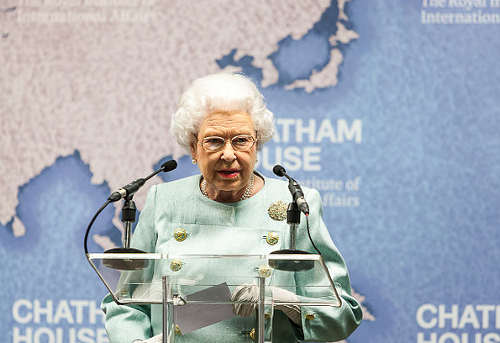 2014
- Aged 88, Queen Elizabeth II was still carrying out most of her
official business as head of state – including official
visits and
speeches
2014
- Aged 88, Queen Elizabeth II was still carrying out most of her
official business as head of state – including official
visits and
speeches (The end of this article has been updated, relative to the audio text, to take account of the death of queen Elizabeth II on September 8th 2022, at the age of 96.)
At the age of 94, Queen Elizabeth II still carried out many of the essential jobs of the Head of State, though age and the Covid epidemic combined to significantly reduce her workload after 2020. She still had regular discussions with her Prime Minister, and signed the documents that require Royal Assent. While most people of her age had been retired for close on 30 years, Queen Elizabeth II often intimated that she would never retire, and would carry out her duties to the country and to her other dominions as long as she was able to.
Paperback or e-book
Includes new resources, more exercises and answers.
Elvis Presley, Route 66, Martin Luther King, Las Vegas, the Mississippi + 17 more people, places and events that have helped define today's USA
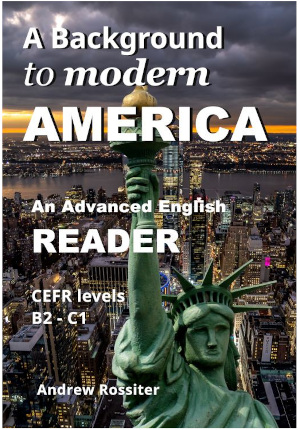
That is exactly what she did. On 8th September
2022, Queen
Elizabeth II died peacefully at her summer residence, the castle of
Balmoral in Scotland. She was succeed by her eldest son Charles, who has
become King Charles III.Includes new resources, more exercises and answers.
Elvis Presley, Route 66, Martin Luther King, Las Vegas, the Mississippi + 17 more people, places and events that have helped define today's USA
CLICK FOR DETAILS

WORDS
eldest: oldest - heir: successor, follower - demure: reserved - shy: timid - notorious - famous for bad reasons - commoner : non-aristocratic person (c.f. the House of Commons) - eventually: finally - regnal: royal - realm: kingdom - workload: the amount of work one has to do - close on : nearly - intimate (verb) : indirectly suggest - milestone: significant point, marker.Printing: A printer-friendly document - better than PDF
Copyright © Linguapress. Do not copy this document to any other website
Copying permitted for personal study, or by teachers for use with their students
STUDENTS' WORKSHEET
Elizabeth: the Queen who almost wasn't
Text study.1. Picturesque phrases; choose the nearest equivalent of each of the following expressions: click down arrow and select the correct answer.
- Assuming that :
- Rocked to the core :
- Thrust into the limelight :
- It came as a bombshell :
- has had its ups and downs... :
The text contains a number
of nouns formed on the root of other words
in the same family. As you listen to the text, pick out and write down
the nouns derived from the following words:
shy
difficult aristocrat
king urgent attach
monarch
3 Reading for information
Queen Elizabeth's grandfather was King . (two words)
King Edward VIII was Elizabeth's . (one word)
Complete these sentences using information from the text, and providing the number of words indicated
(Add
at least 10 words) Edward VIII abdicated ......
(Add
at least 10 words) King George VI died ......
(Add
at least 10 words) Elizabeth had to fly back quickly from
Africa because ......
(Add
at least 10 words) Queen
Victoria ......
(Add
exactly seven
words) Elizabeth
II said that she would remain working as Queen ......
To
save your answers, either take a screenshot, or else
select the whole Text
Study section, and paste into a word-processing document,
a text document, an email or whatever programme or app used by your
class or school.
For teachers:
Introduction: This text is not a traditional schoolbook biography of Queen Elizabeth II. It does not tell her life story... her marriage to Prince Philip of Greece and Denmark when she was just 21, her four children, starting with the birth of Prince Charles when she was 22, her coronation in 1953, her role of head of state which started when Winston Churchill was Prime Minister, her position "above politics", the highs and lows of her reign ... (the low points being 1992 when three of her children divorced or separated, a year she called her "annus horribilis", or 1997 after the death of Diana, when the Queen was accused of being cold while the whole nation mourned.) Your students may be able to provide some of this information, or certainly to find it out if you ask them.This text is more the story of how a young girl was propelled by circumstances into a position that she had not expected to be in, and how she has made - by general consensus - a great success of it.
Queen Elizabeth has been a point of reference in Britain and indeed in the world for almost seventy years. Most people in Britain have never known life without "the Queen". Some time, probably in less than ten years from now, Queen Elizabeth will no longer be there. This will be a moment of huge rupture in Britain and well beyond its shores. For many, Queen Elizabeth is not just the Queen, she is the monarchy. Will this British institution survive for long after she has gone? Probably? Maybe? Perhaps not for long?
Grammar: Conditionals. Though this text does not contain many examples of conditionals, the content almost encourages revision of the third conditional (unfulfilled hypothesis). The young Princess Elizabeth was not destined to become Queen, but she did. Ask all students to look at the text and make up three unfulfilled hypothetical statements starting ....
If Elizabeth had had
an elder brother.......
If "uncle Edward" had not ......
If King George VI....
If Queen Elizabeth.......
There are lots of potential ways in which to complete each of these
sentences. Compare the unfulfilled huypothetical "if"
structure with the open conditional structure which is used in the
final sentence or the article.If "uncle Edward" had not ......
If King George VI....
If Queen Elizabeth.......
For a clear explanation of the use of conditionals in English, see A Descriptive Grammar of English, § 1.5 pages 16 - 20
© linguapress.com

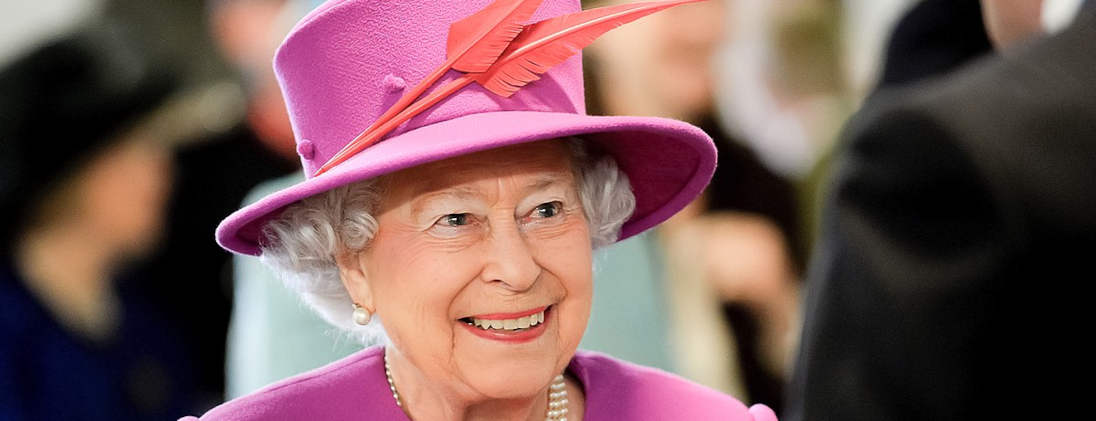


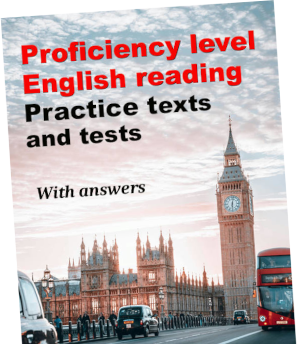
 Copyright
information.
Copyright
information.